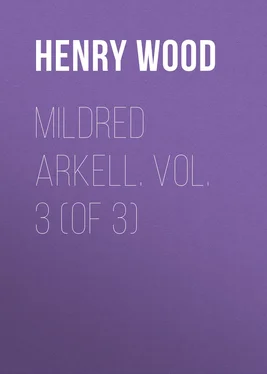Henry Wood - Mildred Arkell. Vol. 3 (of 3)
Здесь есть возможность читать онлайн «Henry Wood - Mildred Arkell. Vol. 3 (of 3)» — ознакомительный отрывок электронной книги совершенно бесплатно, а после прочтения отрывка купить полную версию. В некоторых случаях можно слушать аудио, скачать через торрент в формате fb2 и присутствует краткое содержание. Жанр: foreign_sf, literature_19, foreign_antique, foreign_prose, на английском языке. Описание произведения, (предисловие) а так же отзывы посетителей доступны на портале библиотеки ЛибКат.
- Название:Mildred Arkell. Vol. 3 (of 3)
- Автор:
- Жанр:
- Год:неизвестен
- ISBN:нет данных
- Рейтинг книги:5 / 5. Голосов: 1
-
Избранное:Добавить в избранное
- Отзывы:
-
Ваша оценка:
- 100
- 1
- 2
- 3
- 4
- 5
Mildred Arkell. Vol. 3 (of 3): краткое содержание, описание и аннотация
Предлагаем к чтению аннотацию, описание, краткое содержание или предисловие (зависит от того, что написал сам автор книги «Mildred Arkell. Vol. 3 (of 3)»). Если вы не нашли необходимую информацию о книге — напишите в комментариях, мы постараемся отыскать её.
Mildred Arkell. Vol. 3 (of 3) — читать онлайн ознакомительный отрывок
Ниже представлен текст книги, разбитый по страницам. Система сохранения места последней прочитанной страницы, позволяет с удобством читать онлайн бесплатно книгу «Mildred Arkell. Vol. 3 (of 3)», без необходимости каждый раз заново искать на чём Вы остановились. Поставьте закладку, и сможете в любой момент перейти на страницу, на которой закончили чтение.
Интервал:
Закладка:
She had distinctly heard the latch-key put into the street-door lock ; just as she had heard it many a time when her husband used to come home from business in the year last gone by. She heard it turned in the lock, the peculiar click it used to give, and she heard the door quietly open and then close again, as if some one had entered. Not since they went abroad the previous July had she heard those sounds, or had the door thus been opened. There had been but that one latch-key to the door, and Mr. Dundyke, either by chance or intention, had carried it away with him in his pocket. It had been in his pocket during the whole period of their travels, and been lost with him.
What could it mean? Who had come in? Footsteps, slow, hesitating footsteps were crossing the hall; they seemed to halt at the dining-room, and were now ascending the stairs. Mrs. Dundyke was by far too practical a woman to believe in ghosts, but that anything but the ghost of her husband could open the door with that latch-key and be stealing up, was hard to believe.
"Betsey!"
If ever she felt a wish to sink into the wall, or through the floor, she felt it then. The voice which had called out the familiar home name, was her husband's voice; his, and yet not his. His, in a manner; but querulous, worn, weakened. She stood in horror, utterly bewildered, not daring to move, her arms clasping a chair for protection, she knew not from what, her eyes strained on the unlatched door. That it could be her husband returned in life, her thoughts never so much as glanced at.
He pushed open the door, and came in without any surprise in his face or greeting on his tongue; came in and went straight to the fire, and sat down in a chair before it, just as though he had not been gone away an hour—he who had once been David Dundyke. Was it David Dundyke still— was it? He looked thin and shabby, and his hair was cut close to his head, and he was altogether altered. Mrs. Dundyke was gazing at him with a fixed, unnatural stare, like one who has been seized with catalepsy.
He saw her standing there, and turned his head, looking at her for a full minute.
"Betsey!"
She went forward then; it was her husband, and in life. What the mystery could have been she did not know yet—did not glance at in that wild moment—but she fell down at his knees and clasped him to her, and wept delirious tears of joy and agony.
It seemed—when the meeting was over, and the marvelling servants had shaken hands with him, and he had been refreshed with dinner, and the time came for questions—that he could not explain much of the mystery either. He had evidently undergone some great change, physically and mentally, and it had left him the wreck of what he was, with his faculties impaired, and a hesitating speech.
More especially impaired in memory. He could recollect so little of the past; indeed, their sojourn at the hotel at Geneva seemed to have gone from his mind altogether. Mrs. Dundyke saw that he must have had some sort of brain attack; but, what, she could not tell.
"David, where have you been all this while?" she said, soothingly, as he lay on the sofa she had drawn to the fire, and she sat on a stool beneath and clasped his hand.
"All this while? I came back directly."
She paused. "Came back from where?"
"From the bed."
"The bed!" she repeated; and her heart beat with a sick faintness as she felt, for the twentieth time, that henceforth he could only be questioned as a child. "From the bed you lay in when you were ill?"
"Yes."
"Were you ill long?"
"No. I lay in it after I got well: my head and my legs were not strong. They turned. It was the bed in the kitchen with the large white pillows. They slept in the back room."
"Who did?"
"Paul and Marie. She's his wife."
"Did they take care of you?"
"Yes, they took care of me. Little Paul used to fetch the water. He's seven."
"Do you remember–" (she spoke the words with trembling, lest the name should excite him) "Mr. Hardcastle?"
It did in some degree. He lay looking at his wife, his face and thoughts working. "Hardcastle! It was him that—that—was with me when I fell down."
"Where did you fall?" she asked, as quietly as she could.
"In the sun. We walked a long, long way, and he gave me something to drink out of a bottle, and I was giddy, and he told me to go to sleep."
"Did he stay with you?"
Mr. Dundyke stared as though he did not understand the question.
"I went giddy. He took my pocket-book; he took out the letters, and put it back to me again. Paul found it. I went to sleep in the sun."
"When did Paul find it?"
David Dundyke appeared unable to comprehend the "when." "In his cart," he said; "he found me too."
"David, dear, try and recollect; did Paul take you to his cottage?"
David looked puzzled, and then nodded his head several times, as if wishing to convince himself of the fact.
"And I suppose you were ill there?"
"I suppose I was ill there; they said so. Marie spoke English; she had been at—at—at sea."
This was not very perspicuous, but Mrs. Dundyke did not care for minor details.
"How did you come home?" she asked. And she glanced suddenly down at his boots; an idea presenting itself to her, that she might see them worn and travel-stained. But they were not. They were the same boots that he had on that last morning in Geneva, and they appeared to have been little worn.
"How did I come home?" he repeated. "I came. Marie said I was well enough. Paul changed the note."
"What note?" she asked.
"The note from England. He didn't see that when he took the others."
"He" evidently meant Mr. Hardcastle. She began to comprehend a little, and put her questions accordingly.
"Mr. Hardcastle must have robbed you, David."
"Mr. Hardcastle robbed me."
She found he had a habit of repeating her words. She had noticed the same peculiarity before, in cases of decaying intellect.
"The bank note that he did not find was the one you had written for over and above what you wanted. Why did you write for it, David?"
This was a back question, and it took a great many others before David could answer. "He might have wanted to borrow more," he said at length; "I'd have lent him all then."
Poor man! That he should have had such blind faith in Mr. Hardcastle as to send for money in case he should "want to borrow more!" Mrs. Dundyke had taken this view of the case from the first.
"You don't believe in him now, David?"
"I don't believe in him now. He has got my bank notes; and he left me in the sun. Paul, put me in the cart when it came by."
"David, why did you not write to me?"
David stared. "I came," he said. And she found afterwards, that he could not write; she was to find that he never attempted to write again.
"Did you send to Geneva?—to me?"
"To Geneva?—to me?"
"To me—me, David; not to you. Did you send to Geneva?"
He shook his head, evidently not knowing what she meant, and seemed to think. Mrs. Dundyke felt nearly sure that he must have lain long insensible, for weeks, perhaps months; that is, not sufficiently conscious to understand or remember; and that when he grew better, Geneva and its doings had faded from his remembrance.
"How did you come home, David?" she asked again. "Did you come alone?"
"Did you come alone—yes, in the diligences, and rail, and sea. I told them all to take me to England; Paul got the money for me; he took the note and brought it back."
Paul had changed it into French money; that must be the meaning of it. Mr. Dundyke put his hand in his pocket and pulled out sundry five-franc pieces.
"Marie's got some. I gave her half."
Mrs. Dundyke hoped it was so. She could hardly understand yet, how he could have found his way home alone; even with the help of "I told them all to take me to England."
Читать дальшеИнтервал:
Закладка:
Похожие книги на «Mildred Arkell. Vol. 3 (of 3)»
Представляем Вашему вниманию похожие книги на «Mildred Arkell. Vol. 3 (of 3)» списком для выбора. Мы отобрали схожую по названию и смыслу литературу в надежде предоставить читателям больше вариантов отыскать новые, интересные, ещё непрочитанные произведения.
Обсуждение, отзывы о книге «Mildred Arkell. Vol. 3 (of 3)» и просто собственные мнения читателей. Оставьте ваши комментарии, напишите, что Вы думаете о произведении, его смысле или главных героях. Укажите что конкретно понравилось, а что нет, и почему Вы так считаете.












